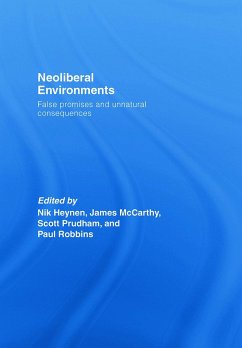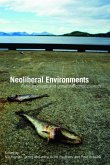It evaluates specific political ecologies and dynamics, and the implications of particular neoliberal reforms and enforcements, while collectively affording new contributors and readers the possibility of thinking comparatively across sectors and geographic contexts. Such specificity and comparative potential serves important analytical functions because it allows the authors and editors to craft stronger, more credible answers to the central questions of what neoliberalism is and what it entails in specific sorts of circumstances.
This volume explores the nexus between nature, markets, deregulation and valuation, using theoretically sharp and empirically rich real-world case studies and analyses of actually existing policy from around the world and across a range of resources. In short, it answers the questions: does neoliberalizing nature work and what work does it do? More specifically, this volume provides answers to a series of urgent questions about the effects of neoliberal policies on environmental governance and quality. What are the implications of privatizing public water utilities in terms of equity in service provision, resource conservation and water quality? Do free trade agreements erode the sovereignty of nations and citizens to regulate environmental pollution, and is this power being transferred to corporations? What does the evidence show about the relationship between that marketization and privatization of nature and conservation objectives? Neoliberal Environments productively engages with all of these questions and more. At the same time, the diverse case studies collectively and decisively challenge the orthodoxies of neoliberal reforms, documenting that the results of such reforms have fallen far short of their ambitions.
Hinweis: Dieser Artikel kann nur an eine deutsche Lieferadresse ausgeliefert werden.
This volume explores the nexus between nature, markets, deregulation and valuation, using theoretically sharp and empirically rich real-world case studies and analyses of actually existing policy from around the world and across a range of resources. In short, it answers the questions: does neoliberalizing nature work and what work does it do? More specifically, this volume provides answers to a series of urgent questions about the effects of neoliberal policies on environmental governance and quality. What are the implications of privatizing public water utilities in terms of equity in service provision, resource conservation and water quality? Do free trade agreements erode the sovereignty of nations and citizens to regulate environmental pollution, and is this power being transferred to corporations? What does the evidence show about the relationship between that marketization and privatization of nature and conservation objectives? Neoliberal Environments productively engages with all of these questions and more. At the same time, the diverse case studies collectively and decisively challenge the orthodoxies of neoliberal reforms, documenting that the results of such reforms have fallen far short of their ambitions.
Hinweis: Dieser Artikel kann nur an eine deutsche Lieferadresse ausgeliefert werden.








